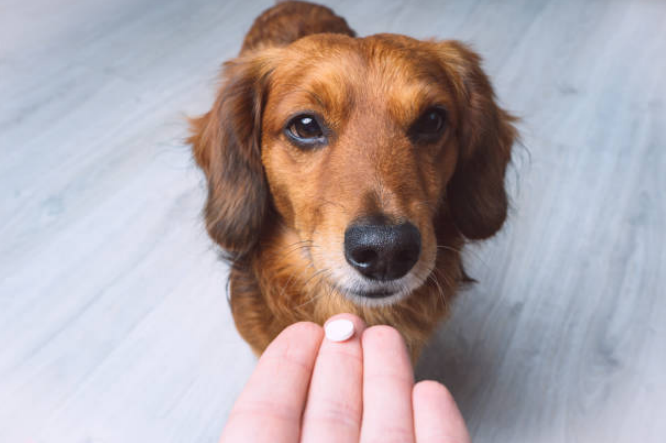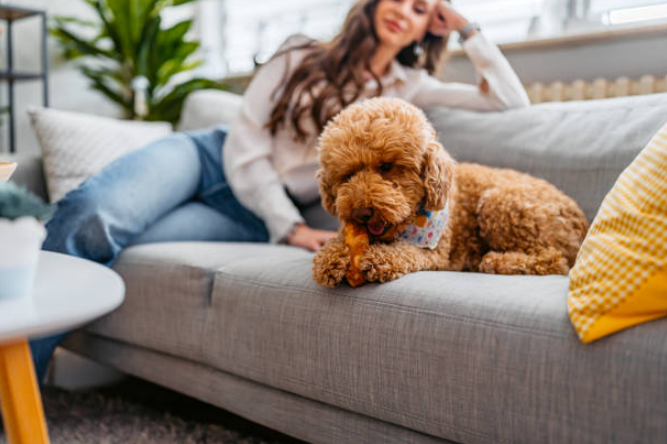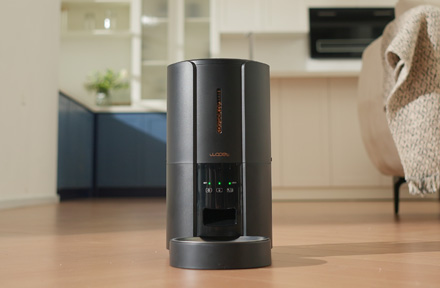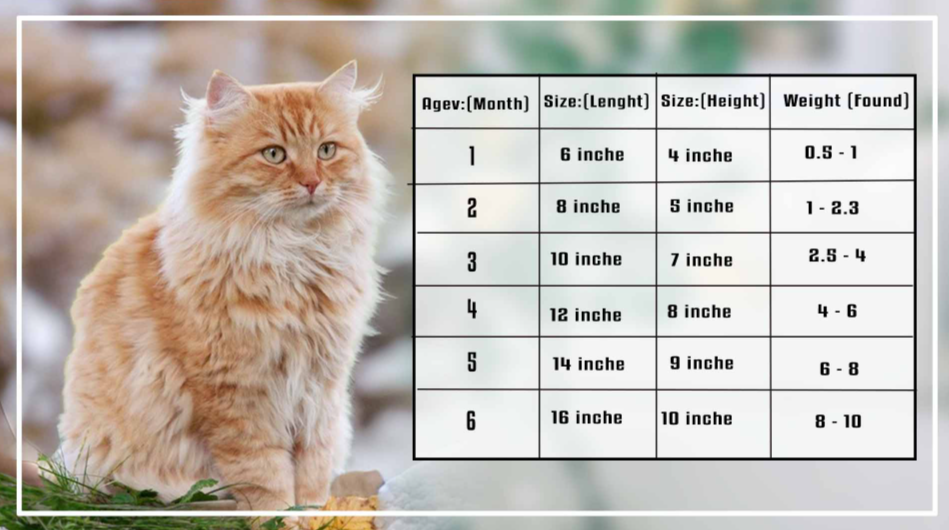Sep 15, 2025
Author:Lisa Martinez
You're not alone if your dog exhibits destructive behavior, anxiety, or restlessness. Every year, millions of pet owners look for safe anxiety meds for dogs. From separation worry before leaving for employment, to loud-sound fears, stress can appear in various forms. Luckily, there are holistic remedies and reliable medical solutions that may help your pet stay calmer.
This guide will discuss anxiety meds for dogs, store-bought substitutes, and softer techniques such as behavior lessons and supplements. Additionally, you will learn how to properly select the best course of action for your dog's welfare and how to identify when your dog needs assistance.
Although they are unable to express it to us, dogs' behavior indicates when they are under stress. Whining, pacing, destructive chewing, shaking, and even hostility are typical symptoms. According to research, 20–40% of dogs uated at veterinary behavior clinics have separation anxiety, making it one of the most common problems.

Some things that can cause anxiety are:
● Loud sounds (tornadoes, fireworks)
● Being abandoned
● Travel or new surroundings
● Cognitive decline and aging
The good news is that help is possible with both natural soothing remedies and anxiety meds for dogs.
When training and adequate time with the owner are lacking, vets suggest calming drugs for pets. Dogs often feel relaxed due to the effect of these medicines on brain transmitters such as serotonin and dopamine.
1. Fluoxetine (Prozac)
● Used to treat persistent aggressiveness and anxiety.
● Frequently recommended for dogs suffering from separation anxiety.
2. Clomipramine (Clomicalm)
● Licensed by the FDA to treat separation anxiety in dogs.
● Raises the levels of serotonin.
3. Sertraline (Zoloft)
● Utilized off-label for continual unease and phobias.
4. Diazepam (Valium) or Alprazolam (Xanax)
● Temporary remedies for travel anxiety or noise phobias.
● Due to adverse consequences, it should only be administered under a veterinarian's supervision.

● Before giving anxiety meds for dogs, always get advice from your veterinarian.
● Never administer drugs without a veterinarian's consent.
● Weight, breed, and medical issues all affect dosage.
Some pet parents prefer non-prescription options. Natural soothing aids and supplements can be found in over-the-counter anxiety meds for dogs.
● L-Theanine: One essential amino that supports calmness is L-Theanine.
● Chamomile & Valerian Root: Plants with soothing qualities include chamomile plus Valerian herb.
● Melatonin: Helps with stress during evenings and rest.
These options help alleviate mild worry without causing harmful side effects. Still, they may not act as strongly as prescribed medicines.
Prescription medications are not necessary for all stressed dogs. Natural substitutes are successful for many pet owners.
L-tryptophan, hemp, and chamomile are among the constituents in these soft chews. Giving is simple and frequently well-received.

They are synthetic substitutes for mother dog pheromones that provide a cozy, secure atmosphere.
During storms or fireworks, weighted vests provide gentle pressure to alleviate tension.
Interactive toys, puzzle dishes, and mental challenges all help decrease stress caused by boredom.
Relief from tension is greatly enhanced through regular physical activity and a nutritious diet.
One challenging issue that dog parents often question is how to help a dog with separation anxiety. Thankfully, there are several methods to make your pet feel calmer.
● Leave a piece of your clothing for comfort.
● Play white noise or soothing music.
Loneliness can be decreased by using machines like the WOpet Automatic Feeder, which lets you feed and even converse with your pet from a distance.
Slowly extend the period your pet remains by itself through short departures.
For severe cases, combine guidance with your vet’s prescribed anxiety treatment for canines.
Pet guardians often wonder if store-bought meds, prescribed drugs, or organic approaches are the ideal paths for easing stress. Each choice carries strengths and downsides. The most suitable plan for your pup will typically depend on the intensity of their anxiety and overall wellness.
Dogs with severe anxiety respond well to prescription anxiety medications. They are powerful, veterinarian-guided, and frequently required when natural assistance and behavior modification are insufficient. The main advantage of prescribed medicine is its ability to manage harsh conditions effectively. If not carefully supervised, they can bring about harmful effects. These include addiction, fatigue, or stomach discomfort.
OTC calming pills for dogs could be an excellent choice for pups experiencing light anxiety or occasional nervousness. They are simple to give, broadly available, and generally safe. Many pet owners typically start here before resorting to stronger treatments. Although convenient, non-prescription medicines are less effective for severe anxiety cases. They might not provide total comfort.
For animals experiencing widespread nervousness, holistic options such as pheromone diffusers, calming chew toys, or consistent daily adjustments may be beneficial.
For numerous owners, such remedies remain gentle, balanced, and cause minimal harmful effects. The main disadvantage is that for dogs with severe or prolonged distress, natural supports might not be strong enough.
Finding a solution matched to your pup’s anxiety level is always the smartest route. Light stress can often be treated with OTC pills or holistic choices. Stronger cases may require prescribed drugs. For the most secure approach, always consult your veterinarian.
Never delay if your dog’s worry results in hostility, harm, or damaging actions. A vet can propose the safest solution and help uncover the underlying cause. Expert advice matters, as nervousness can sometimes be mistaken for medical conditions, such as thyroid disorders.
For more details, review the American Kennel Club’s resource about behaviors linked to separation stress.
Share your pet story, follow the WOpet blog for regular tips on keeping your companion calm. If you need support, contact us to learn how WOpet may assist with your dog’s well-being.
Your pets should always be content and stress-free. Both you and your dog will find life easier with our intelligent feeders, treat dispensers, and pet cameras. Even when you're not there, you can keep your dog comfortable with two-way communication and remote feeding.
The WOpet Automatic Pet Feeder is a well-liked option that guarantees your dog will never go without food, even if you are unable to be at home. The Smart Pet Camera Feeder is particularly beneficial for dogs who suffer from separation anxiety. When your dog needs comfort the most, you may see them, communicate with them, and give them a treat in real time.
Examine our entire selection of smart pet goods to help your pet feel less stressed. WOpet is here to help you and your dog at every stage, from interactive gadgets to automatic feeds.
Under vet direction, fluoxetine and clomipramine are often prescribed and thought to be safe.
No. Human drugs may poison dogs. Before administering any medication, always consult your veterinarian for their opinion.
Yes, for anxiety that is mild to moderate. Interactive feeders, scent diffusers, and calming chews can each be very helpful.
Visit a vet when stress interferes with everyday habits. This includes chewing destructively, constant barking, or self-injury.
Indeed! You may communicate with your dog from a distance using smart feeders and treat dispensers, which ease tension and promote comfort.
Finding the right solution for your dog’s stress takes time and advice. Every creature deserves peace and reassurance. This might come from OTC tablets, prescribed anxiety medicines, or natural solutions.
With proper guidance, care, and the right accessories, make sure your dog feels secure and loved. With WOpet’s innovative care products, you can maintain connection and provide reassurance anytime.
Have questions about caring for your white dog? Feel free to contact us—our team is always happy to help.
Label:
Popular Post

What to Feed a Sick Dog With No Appetite? [2025 Guide]
May 16, 2023

Troubleshooting Common Issues with Automatic Pet Feeders: Tips & Tricks for Pet Owners
Oct 26, 2023

What is a standard Cat Weight chart by age Kg?
Mar 19, 2025

Why Does My Cat Cough After Drinking Water? 8 Potential Reasons
Mar 13, 2023

Why is My Cat Throwing up Water? Top 5 Causes Here
Feb 08, 2023
$109.99
$129.99
Copyright © 2025 WOPET. All Rights Reserved.